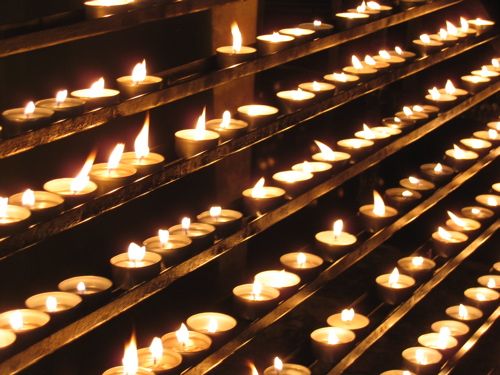
Yes, I chose a well-known word this time around. Why? Because even normal words are awesome, and because many of them have great stories attached. So, in light of Advent (see what I did there), this week’s Word is votive.
We know votives as the word we use for small candles, whether they are the ones we put on our dining tables for a special meal, ones that pepper the nooks and crannies of our homes, or the ones we see lining the sides of churches as in the picture above. So yes, the simple way we use votive is to describe a small candle. BUT, did you ALSO know…
Votive is derived from the Latin verb voveo which means vow or promise. The past participle of voveo is votum which means a vow or promise made to a god. (And of course, votum is also the root of the word “vote.”) So votive means something offered/dedicated/consecrated in accordance with a vow. When you light a candle in a church, the candle itself is called a votive, but the act of lighting the candle is the act of offering something in accordance with a vow or a promise. In Christian terms, what happens is that you offer up a prayer to God on behalf of someone or something, and you light the candle as a tangible sign of that prayer. You literally put your prayer to light.
Now, I know you may think grammar is boring, but can I just tell you something cool about past participles for a second? It will make the word votive even more meaningful, I swear. Past participles describe something that happened in the past but is still continuing into the present. Past participles are like little quantum descriptors because they remind us that time is not strictly linear. For example, the present tense of the verb “to write” is “write.” I write this blog. The past tense is “wrote.” I wrote that blog. The past participle is written. The blog was written. Because the blog I wrote is not only in the past, it’s also still present today, because it exists where people can still read it in the present time. It didn’t go away, even though I wrote it in the past. See?
Okay, so with that in mind, let’s return to votive. If you go into a church and you take a moment to light a candle in prayer, you stay there for a minute. You light the candle (present). You then leave the church where you lit the candle and you go about your day (past). But the candle itself, the votive, is still lit (past participle). The promise, the prayer, the vow you offered up to God, is still going, even after you leave.
This is the symbolism of lighting a candle in prayer. It is one small way we try to convey the reality we believe to be true, which is that we offer up prayers to God, and those prayers continue to be heard even after we have uttered them. They do not fade away. They are not forgotten. They remain, like a small flicker of light, like a sign of our vow and our promise and our hope, even after they’ve left our lips and our hearts.
This is why so many people decide to light the unity candle during weddings. It is a vow, a promise, of unity, made tangible for all to see. If speaking vows is the auditory tangible sign, and the ring is the physical sign, the candle is the visual sign. We will come together, says the candle. We will be one. And in our unity, we will seek to reflect the light of God who is One with us.
During Advent, we light candles. We light a candle for hope, for peace, for joy, for love. And then, finally, we light the Christ candle. We remember that Jesus said, “I am the light of the world.” And we keep that candle lit through Epiphany to remind us that Jesus is a kind of living past participle; he is the One who has come, and is coming still. He is One who lived in the past, but whose life continues into the present.
How can we wrap our minds around something like that? We can’t really, so we turn to the beauty of a flickering candle, which symbolizes the reality that cannot be simply named, but must also be experienced, entered into, welcomed, adored.
When we light a candle in prayer, we align ourselves and our intentions with the work of God. We offer ourselves up to the work of God in the world. We consecrate a moment by asking for God’s will to be done on earth as it is in heaven. In the flicker of light, we pray for the Light of the World to come, and we vow to be people who will wait until he does.
Add Your Voice!